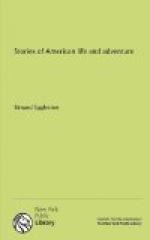Two of these went to the spring to get water, and, in doing this, they were obliged to put down their guns. In an instant Jasper and his friend leaped out of the bushes and seized the two guns. They killed the two guards who had guns, before the latter could shoot them. Then they knocked down every man who resisted them, and got possession of all the rest of the guns of the British. With these they took the eight soldiers prisoners. They now gave guns to the American prisoners, and marched away with the eight British soldiers in captivity.
Jasper was one of the boldest of men. He did many brave things, but at last he lost his life in saving the flag of his company in battle.
SONG OF MARION’S MEN.
Our band is few, but tried and true,
Our leader frank and bold:
The British soldier trembles
When Marion’s name is
told.
We have no fort but dark green woods,
Our tent’s a shady tree:
We know the forest round us
As sailors know the sea.
With merry songs we mock the wind
That in the tree top grieves,
And slumber long and sweetly
On beds of rustling leaves.
Well knows the fair and friendly moon
The band that Marion leads,—
The glitter of their rifles,
The scampering of their steeds.
’Tis life to ride the fiery horse
Across the moonlight plain;
’Tis life to feel the night wind
That lifts his tossing mane.
A moment in the British camp—
A moment—and away
Back to the pathless forest,
Before the peep of day.
Adapted from Bryant.
[Illustration: One of Marion’s Men.]
A BRAVE GIRL.
In the time of the Revolution, a regiment of Hessian soldiers hired to fight on the British side were camped in South Carolina. They took possession of the lower part of the house of a farmer named Gibbes. The family were forced to retire to the upper story.
Two American boats came up the Stono River, and attacked these Hessians. Cannon balls were soon falling all about the house. Mr. Gibbes, who was so ill that he could hardly walk, got leave to move his family to another place. To do this, the whole family had to cross a field where the cannon balls were flying thick. At last they got out of reach of the cannons. Then they remembered that a little baby had been left behind. Neither Mr. Gibbes nor his wife was able to travel back to the house again. The negroes were too much frightened to go. All the rest were children.
Little Mary Anne Gibbes was only thirteen years old. The baby that had been left was her cousin.
“I will go and get him,” she said.
It was a dark and stormy night. She went back into the heat of the battle. When she reached the house, the soldier who stood at the door would not let her go in. But, with tears in her eyes, she begged so hard that he let her pass. In the third story of the house she found the baby.




